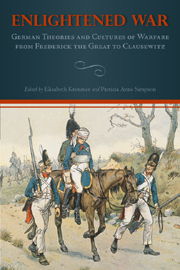Book contents
- Frontmatter
- Contents
- List of Illustrations
- Acknowledgments
- Introduction: Enlightened Warfare in Eighteenth-Century Germany
- Part I War and Enlightenment
- Part II Cultures of War in Classicism and Romanticism
- Part III War and Gender
- Part IV War and Theory
- 10 Just War and Perpetual Peace: Kant on the Legitimate Use of Political Violence
- 11 Military Intelligence: On Carl von Clausewitz's Hermeneutics of Disturbance and Probability
- 12 Host Nations: Carl von Clausewitz and the New U.S. Army/Marine Corps Field Manual, FM 3-24, MCWP 3-33.5, Counterinsurgency
- Bibliography
- Notes on the Contributors
- Index
11 - Military Intelligence: On Carl von Clausewitz's Hermeneutics of Disturbance and Probability
from Part IV - War and Theory
Published online by Cambridge University Press: 05 February 2013
- Frontmatter
- Contents
- List of Illustrations
- Acknowledgments
- Introduction: Enlightened Warfare in Eighteenth-Century Germany
- Part I War and Enlightenment
- Part II Cultures of War in Classicism and Romanticism
- Part III War and Gender
- Part IV War and Theory
- 10 Just War and Perpetual Peace: Kant on the Legitimate Use of Political Violence
- 11 Military Intelligence: On Carl von Clausewitz's Hermeneutics of Disturbance and Probability
- 12 Host Nations: Carl von Clausewitz and the New U.S. Army/Marine Corps Field Manual, FM 3-24, MCWP 3-33.5, Counterinsurgency
- Bibliography
- Notes on the Contributors
- Index
Summary
FOLLOWING NAPOLEON'S TRIUMPHANT military campaigns across Europe and ultimate defeat at Waterloo, the Prussian General Carl von Clausewitz committed his thoughts and experience of war to paper. As director of the Allgemeine Kriegsschule, a war college in Berlin, he had sufficient repose and time to compile his voluminous work On War. Due to his early and sudden death — he died of cholera in 1831 — the book remained unfinished. For the most part it comprises an essayistic and even aphoristic collection of fragments, a compendium of the lessons learned in the campaigns against the French armies. The 500-page volume offers the commander on the battlefield little simple, straightforward advice, and is effectively unusable as a manual in combat. Clausewitz's work nonetheless has become one of the undisputed classics of military tactics and strategy. On War still provides the basic outline for the current US Marines' Fleet Marine Field Manual (FMFM)1. Warfighting.
Clausewitz's text can be situated in a greater cultural shift that became legible in the decline of the Enlightenment and the rise of Romanticism. Whereas Enlightenment thought favored the controlling force of reason, early nineteenth-century theory raised doubts about the omnipotence of rationality and focused instead on the dynamic, complex, and unpredictable character of the world. In a similar vein, Clausewitz developed a theory of warfare that emphasized the limits of strategic thought and acknowledged the irreducible presence of errors and complexity in war caused by unpredictable events such as malfunctioning equipment, sudden weather changes, or the interruption of communication.
- Type
- Chapter
- Information
- Enlightened WarGerman Theories and Cultures of Warfare from Frederick the Great to Clausewitz, pp. 258 - 278Publisher: Boydell & BrewerPrint publication year: 2011



